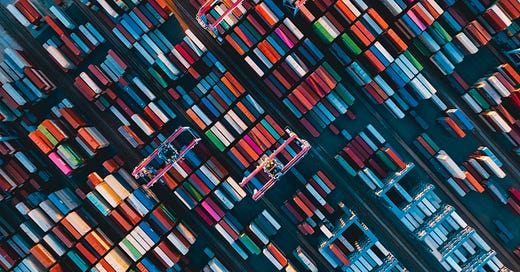Podcast: "They're trying to have their cake and eat it too"
Dmitry Grozoubinski on "why politicians lie about trade"
November will mark 25 years since the Battle of Seattle - the summit and street fight that brought down the curtain on a half-century of ever-broadening global trade negotiations. “Anti-globalisation” activism, a prolonged financial crisis, and growing assertiveness by governments in emerging markets ensured stasis but it wasn’t until 2016 - with the Brexit referendum and Donald Trump's election in the US - that the long postwar trade liberalisation process threatened to go into reverse.
During that backlash, Dmitry Grozoubinski - a former Australian trade negotiator with a turn of phrase made for Twitter - found an audience. As he writes in Why Politicians Lie About Trade: ... and What You Need to Know About It (published today by Canbury Press), he was “in the right place at the right time, with the right credentials, to stand in front of the firehose of bullshit that was the public debate around trade policy in the 2010s and cry: ‘um, no, that's not how it works’”.
In a New Books Network interview, he told me: “Politicians have a habit - because trade policy can be so complex and dense and the causalities aren't linear and they can be hard to wrap your mind around - of trying to pretend that those choices aren't choices, that there is something we can do that just is win, win, win for absolutely everybody and nobody loses out. So we're not really making a choice. We're just doing the obvious, easy, right thing, with no losers”.
“The US has just announced a slew of tariffs - import taxes on a range of Chinese products related to medical equipment and mostly sustainability, so electric cars and so on. And you have the US Trade Representative and Janet Yellen [Treasury Secretary] out there tweeting: ‘well, you know, tariffs don't affect consumer prices’. Well yes, they do. It could still be the right policy. There could still be really good arguments for putting tariffs on Chinese electric vehicles because you think China is making them in an unfair way, subsidising, or you have security concerns or what have you. But they are trying to pretend that taxing something at the border at 100% of its value isn't going to impact consumer prices. And that's just not true. They're trying to have their cake and eat it too and pretend that a choice that they're making between consumer interests and other priorities isn't a choice”.
We discussed how politicians could better communicate trade choices, Brexit, the future of the World Trade Organization, and his optimistic and pessimistic trade outlook. The pessimistic scenario involves a “direct or close-to-direct military confrontation between the US and China around Taiwan. And that leads to rapid and sudden interruptions to trade between those two and effectively between everybody. That is a scenario that is that would be so horrific and disruptive that even talking about planning for it is almost silly, just because of the level of integration between those two economies, how many components bounce back and forth and so on. It is an apocalyptic scenario where, at that point, we're going to have to start again. We're going to have to rethink every assumption about how our economy works. We're going to have to retool millions of supply chains due to massive disruptions. The financial markets will crash … It's just unfathomably bad”.
For my Writers’ Writers tip sheet, he chose The Great Convergence: Information Technology and the New Globalization by Richard Baldwin (Harvard University Press, 2019) and The Art of Explanation: How to Communicate with Clarity and Confidence by Ros Atkins (Wildfire, 2023).





